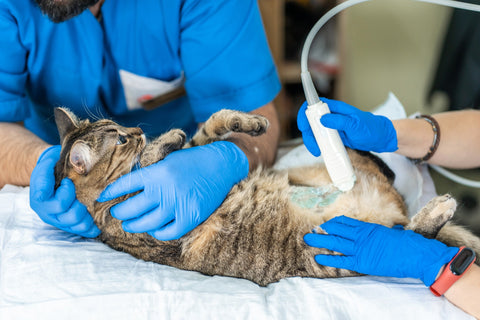8 Min Read
Cat Pregnancy Tests: Are They Reliable?
Key takeaway
If you believe your cat is expecting kittens, you’ll need to have a cat pregnancy test completed at your vet’s office. Reliable at-home pregnancy tests for cats don’t yet exist. Your veterinarian can definitively determine, through a course of test options, if your cat is expecting.

Why pet owners are switching to online vet care with Dutch
-
Prescriptions delivered free to you
-
Fast access to Licensed Vets over video
-
Unlimited video visits and follow-ups
When people are expecting, they commonly share their news with close family and friends! Cats aren’t like that. They won’t tell you when there’s a litter on the way. At least, not in words. If you suspect your feline is expecting, it would be nice to run to the drug store and bring home a test kit that will give you the answer in minutes. Unfortunately, it’s not as simple as that.
- How Can I Tell If My Cat Is Pregnant?
- Signs Your Cat Is Pregnant
- Is There A Cat Pregnancy Test?
- Cat Pregnancy Tests: Frequently Asked Questions
- Summary
- A New Type Of Veterinary Care
How Can I Tell If My Cat Is Pregnant?
For starters, if your cat has been spayed, she is less likely to be pregnant. However, any animal that is displaying physical or behavioral changes consistent with pregnancy should be seen by a veterinarian to be checked out, as certain tumors and other medical conditions can mimic the effects of pregnancy. For an unspayed (intact) cat to get pregnant, she has to be mounted by a tomcat near a heat cycle.
A female cat typically goes into heat, more properly called the estrous cycle, as the days get longer, following the warm seasons, and stop cycling as the days get shorter. Estrus (the actual heat or fertility period) can start when a cat is between 4 and 12 months old, and is typically only about five days. If a cat does not become pregnant in that time, they will continue to cycle in and out of heat every few weeks until she is bred or the days begin to shorten. An estrous cycle will resume between 1 and 6 weeks after a cat gives birth, so it’s possible for a nursing mother cat to become pregnant.

Although some cats display characteristic signs, it is not always outwardly possible to tell if your cat is in estrus - particularly because many signs are not specific to a heat cycle. Female cats in heat can exhibit characteristic behavior which may include rolling about, rubbing against objects, spraying urine, kneading, and loud yowling vocalizations.
Signs Your Cat Is Pregnant
Cats do not get the characteristic cravings for strange treats that pregnant people do, such as pickles and ice cream! However, increased appetite can be a sign of pregnancy in cats. In fact, many symptoms of pregnancy are similar for both humans and felines. These include weight gain, morning sickness and changes in the color, size and shape of niplles.
Unfortunately, in cats these signs don’t appear early enough to prepare for the expecting mother’s nutrition and medical needs. The gestation period for a cat is only 60 to 65 days, and often the signs, if any, don’t appear until well into the second half of the pregnancy, about two or three weeks before the delivery date, or there may be no advance, obvious external warning signs.
If your cat had contact with an intact male cat, or tom, you can have a test done at your veterinary office.

Is There A Cat Pregnancy Test?
A veterinarian can detect signs of cat pregnancy, sometimes as early as 21 to 30 days after conception. They can physically examine the abdomen by palpating it. They may try to detect pregnancy by performing an abdominal ultrasound. In the last week or two before delivery, getting an X-ray to help determine how many kittens are in the litter, is extremely important, come delivery time - so you know whether all of the kittens have gotten out, or if something has gone wrong, and your cat needs medical intervention.
The most common definitive test, however, is to check for the presence of a hormone called relaxin. Relaxin builds up during pregnancy, and it ultimately serves to allow the cat’s cervix to relax and make delivery easier. The hormone can be present both in the blood and the urine of pregnant cats.

There has been limited success in developing tests that detect relaxin in the urine. Therefore, vets use a blood draw to diagnose pregnancy, and to assess whether your cat does not have any underlying medical conditions which might affect her pregnancy. You won’t have to wait long for the results; they’re usually available the same day. .
A detectable level of relaxin is typically present in the blood about 25 days after the cat has conceived. In short, determining whether a cat is pregnant requires time, skill, and a little bit of finesse; Consult your veterinarian for a more specialized plan for your cat!

Cat Pregnancy Tests: Frequently Asked Questions
How can I confirm my cat is pregnant?
You may have your suspicions, but if you want to make sure that the new kittens make their appearance well-nourished, safe and sound, the only way is to visit your veterinarian. Only they can conduct the true and accurate test, as well as monitor your cat’s health and the health of her fetuses.
How can I test my cat’s pregnancy at home?
You can’t, at least not today. Besides the difficulty of convincing Kitty to pee on a strip, researchers have yet to develop a reliable test for relaxin in the urine.
Efforts to test raw urine samples have been largely unsuccessful. With some of the attempts, regular urine has still tested negative for relaxin deep into pregnancy. There’s been a little more indication of success with another method: diluting urine from possibly pregnant cats in serum from non-pregnant cats. Given this, there’s an excellent chance that there will eventually be a home feline pregnancy test. However, there’s nothing at your corner drug store that will help you right now.
Watching for signs of pregnancy – increased or decreased appetite or anorexia, weight gain, nausea or vomiting, , changes in the size and color of nipples – is not an effective method of preparing for kittens. It is vital to consult a veterinarian prior to this stage, as your cat will benefit greatly from advance knowledge and support from you during her pregnancy. Only a consultation with your veterinarian will provide you with the peace of mind and safety your cat and her kittens deserve!
Will a human pregnancy test work on a cat?
No. Cats aren’t people and people aren’t cats. A human pregnancy test won’t tell you anything about your cat’s pending motherhood status.
Summary
- If your female cat has never been spayed and has come into contact with an intact male cat, she may be pregnant.
- Cat pregnancies last 60 to 65 days, and the signs of pregnancy, if present, typically don’t start to occur until about halfway through that period.
- The definitive test for cat pregnancy is a blood draw to check for the presence of a hormone called relaxin.
- While an at home cat pregnancy test may eventually be available, today only a veterinarian can test to see if your cat is pregnant.
- Additionally, a veterinarian can tell you about whether the fetuses are viable (alive) and healthy, able to be carried to term (birth), and how many to expect, so that if your cat goes into distress while giving birth, you know when to seek emergency help.
A New Type Of Veterinary Care
The only way to determine if a cat is pregnant is to bring her into a veterinary office, but not all pet care requires a physical animal hospital visit. If you haven’t found the time to get your pet to the doctor, or if you’ve been frustrated by the long wait times, there are now adjunctive methods which you can seek while you wait for an appointment! .
A new company called Dutch can bring pet treatment plans and even prescription medications for certain chronic conditions right to your door. Dutch was created by pet parents like you and by board-certified veterinary specialists. Just as there’s tele-medicine available for your own medical care, there’s now also tele-medicine for your animal companions.
You start with an online visit. After the consultation, a Dutch vet will determine if your pet is a good candidate for online treatment. If so, you’ll receive a customized treatment plan. Treatments and meds will be delivered to your home address. Furthermore, there will be an ongoing care relationship with a Dutch-affiliated vet.
Dutch maintains relationships with local veterinarians throughout the country. If there’s something that can’t be done over the internet (for example, if you need a blood draw to find out if your cat is pregnant), they’ll recommend that you visit a local veterinary facility.
Dutch provides solid, science-based treatment and ongoing support from qualified veterinarians and has the experience and expertise to prescribe medicine and care for your precious friend.
Share
References
-
Home Pregnancy Test for Cats?, CABI VetMed Resource, https://www.cabi.org/vetmedresource/news/16352
-
Management of Reproduction of Cats, Merck Veterinary Manual, Https://www.merckvetmanual.com/cat-owners/reproductive-disorders-of-cats/management-of-reproduction-of-cats
-
“Ovarian Remnant Syndrome in Dogs and Cats.” Veterinary Information Network, VIN Veterinary Partner, 28 Oct. 2013, https://veterinarypartner.vin.com/default.aspx?pid=19239&id=5998538.



